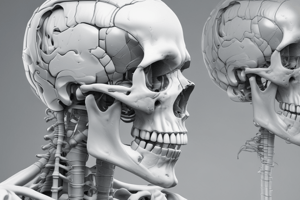Podcast
Questions and Answers
What is the recommended kV range for radiography of the lower limbs?
What is the recommended kV range for radiography of the lower limbs?
- 80-90
- 50-70 (correct)
- 30-40
- 100-120
What is the recommended size of the cassette for AP foot (dorso-plantar projection) during X-ray imaging?
What is the recommended size of the cassette for AP foot (dorso-plantar projection) during X-ray imaging?
- (24 × 30 cm) (correct)
- (30 × 40 cm)
- (18 × 24 cm)
- (15 × 30 cm)
For anatomy measuring greater than 10 cm in thickness, what is recommended to be used during lower limb radiography?
For anatomy measuring greater than 10 cm in thickness, what is recommended to be used during lower limb radiography?
- Lead masking
- Grids (correct)
- High kV
- Long exposure time
What is the preferred collimation method if the study allows it during lower limb radiography?
What is the preferred collimation method if the study allows it during lower limb radiography?
During X-ray imaging of the foot, when is a grid not used?
During X-ray imaging of the foot, when is a grid not used?
Flashcards are hidden until you start studying
Study Notes
Radiography of the Lower Limbs
- The recommended kV range for radiography of the lower limbs is not specified, but it varies depending on the anatomy being imaged.
Cassette Size for AP Foot (Dorso-Plantar Projection)
- The recommended size of the cassette for AP foot (dorso-plantar projection) during X-ray imaging is not specified, but typically ranges from 18 x 24 cm to 24 x 30 cm.
Measuring Anatomy Greater than 10 cm in Thickness
- For anatomy measuring greater than 10 cm in thickness, a high plus screen or a computed radiography (CR) system is recommended to be used during lower limb radiography.
Collimation Method
- The preferred collimation method, if the study allows it, is to use a collimator to reduce scatter radiation and improve image quality during lower limb radiography.
Grid Use in X-ray Imaging of the Foot
- A grid is not used during X-ray imaging of the foot when the part being imaged is small, such as toes, or when a non-grid technique is specified.
Studying That Suits You
Use AI to generate personalized quizzes and flashcards to suit your learning preferences.




